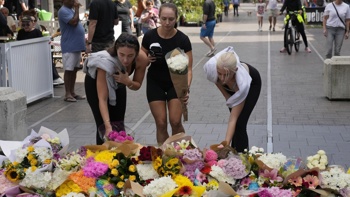Judge Amy Coney Barrett, a federal appellate judge and Notre Dame law professor, is a proven conservative with a compelling personal story who has long been atop President Donald Trump's Supreme Court short list.
Trump announced he is nominating Barrett to be the new high court justice during a ceremony at the White House Rose Garden. The Senate Judiciary Committee will begin confirmation hearings on Barrett's nomination on October 12.
Barrett, the mother of seven children and a former law clerk to the late right-wing beacon Justice Antonin Scalia, Barrett, now 48, was a finalist for the Supreme Court spot that went to Brett Kavanaugh in 2018.
She met with Trump to discuss the nomination on Monday, sources close to the process told CNN.
Advocates on the far right have backed her possible nomination because of her writings on faith and the law. Religious conservatives were especially energized for Barrett when, during the 2017 confirmation hearing for her current judgeship, Democratic Sen. Dianne Feinstein of California suggested to her that the "dogma lives loudly within you." Barrett supporters believed the nominee was being disparaged for her Catholicism.
For all the reasons that Trump sees Barrett as a potential successor to the late Justice Ruth Bader Ginsburg, Democratic senators and liberal advocates have long been poised to oppose her, warning particularly that she could roll back abortion rights and invalidate the Affordable Care Act.
Critics beyond Feinstein, the senior Democrat on the Senate Judiciary Committee, have suggested Barrett's religious views would influence her rulings.
Barrett testified that her faith would not shape her rulings at the Senate hearings for appointment by Trump to the 7th US Circuit Court of Appeals, which covers Indiana, Illinois and Wisconsin.
2nd Amendment, immigration and abortion
Since joining the appellate bench, Barrett has been a cautious jurist, plainly aware that she remains under a national microscope for any Supreme Court confirmation battle. Still, she has demonstrated her conservative bona fides on Second Amendment gun rights, immigration and abortion.
Last year, she dissented alone when a 7th Circuit panel majority rejected a Second Amendment challenge from a man found guilty of felony mail fraud and prohibited from possessing a firearm under federal and Wisconsin law.
"History is consistent with common sense: it demonstrates that legislatures have the power to prohibit dangerous people from possessing guns," she wrote in Kanter v. Barr, applying an originalist approach that looked to the 18th-century intentions. "But that power extends only to people who are dangerous. Founding legislatures did not strip felons of the right to bear arms simply because of their status as felons."
Barrett concluded, "Holding that the ban is constitutional ... does not put the government through its paces, but instead treats the Second Amendment as a second-class right."
More recently in June, she dissented as a 7th Circuit panel left intact a US district court decision temporarily blocking a Trump policy that disadvantaged green card applicants who apply for any public assistance. In dispute were federal immigration regulations regarding when an applicant would be deemed a "public charge" and ineligible for permanent status in the US.
In her dissent, Barrett wrote that the Trump administration's interpretation of the relevant "public charge" law was not "unreasonable." The 7th Circuit majority in Cook County v. Wolf countered that her construction failed to take account of the immigrants who would "bear the brunt of the" new rule.
In 2018, when the full 7th Circuit declined to reconsider a dispute over an Indiana abortion regulation requiring that the post-abortion fetal remains be cremated or buried, Barrett dissented with fellow conservatives. They began by focusing on a more contentious provision that had been earlier invalidated and not subject to the appeal.
The Supreme Court confirmation process, explained
That provision made it unlawful for physicians to perform an abortion because of the race, sex or disability of the fetus. Barrett joined an opinion written by fellow conservatives referring to the law as a "eugenics statute." Barrett and the others asserted, going beyond the legal dispute before them, that "None of the Court's abortion decisions holds that states are powerless to prevent abortions designed to choose the sex, race, and other attributes of children."
In an early 2017 law review essay, reviewing a book related to the Supreme Court ruling on the Affordable Care Act, Barrett criticized Chief Justice John Roberts' rationale that saved the law in 2012.
"Chief Justice Roberts pushed the Affordable Care Act beyond its plausible meaning to save the statute. He construed the penalty imposed on those without health insurance as a tax, which permitted him to sustain the statute as a valid exercise of the taxing power."
Should Barrett be confirmed before Election Day or shortly thereafter, one of her earliest cases would be on the latest Obamacare challenge. The court is scheduled to hear that case on November 10.
Roe v. Wade and earlier meeting with Trump
Born in New Orleans in 1972 and a 1997 Notre Dame law graduate, Barrett worked in private practice and then became a law professor, settling at Notre Dame in 2002. According to the questionnaire she filed with the Senate Judiciary Committee in 2017, she was named Notre Dame's law professor of the year in 2006 and 2016.
She has been a popular and provocative figure in the classroom, telling Feinstein in a written response to follow-up questions, "My role as an academic was to stand outside of the system and to provoke students of the law to think hard about how the system works. Sometimes that involves critiques of the system. A judge, by contrast, operates within the system, and her duty is to apply the law as it exists."
Barrett also responded to a written question regarding her previously expressed view that adherence to precedent might be "unlawful" if it conflicts with the Constitution's "original meaning." A strong point of concern for Barrett's critics is whether she would help lead the way toward reversing the 1973 landmark Roe v. Wade ruling, which made abortion legal nationwide.
In her questionnaire, Barrett rejected the suggestion that she had already shown her hand against the preservation of Supreme Court milestones. She said she was "describing the academic debate that began in the 1980s about the relationship between originalism and stare decisis," that is, regard for court precedent. "I took no side in that debate," Barrett wrote.
In 2012, she supported the Becket Fund for Religious Liberty's opposition to the Obama administration's fractious attempt to accommodate religious interests in the Affordable Care Act's contraceptive coverage mandate.
When asked whether she would recuse herself from ongoing litigation over the ACA birth control mandate, she said she would look to federal law on recusals to decide whether she was required to sit out any case. She overall professed her ability to be impartial on disputes on which she had earlier spoken out.
When Trump first interviewed Barrett for an earlier Supreme Court opening, some White House aides leaked word that there was a lack of chemistry. Irrespective of whether that was true, Indiana law professor Steve Sanders said their natural temperaments seem at odds.
Sanders, who has studied Barrett's record, said on the substance of the law in her relatively short appeals court tenure, "She hasn't demonstrated a lot of boldness. She hasn't carved out a special niche. I think she is being cautious because the spotlight has been on her from the beginning."
He added of her equally reserved demeanour, "I don't get the impression that she's the kind of person that you would just pour a glass of whiskey with at the end of the day and have a free-ranging discussion. She seems proper and conservative in her personal presentation."
text by Joan Biskupic, CNN legal analyst & Supreme Court biographer
Take your Radio, Podcasts and Music with you









